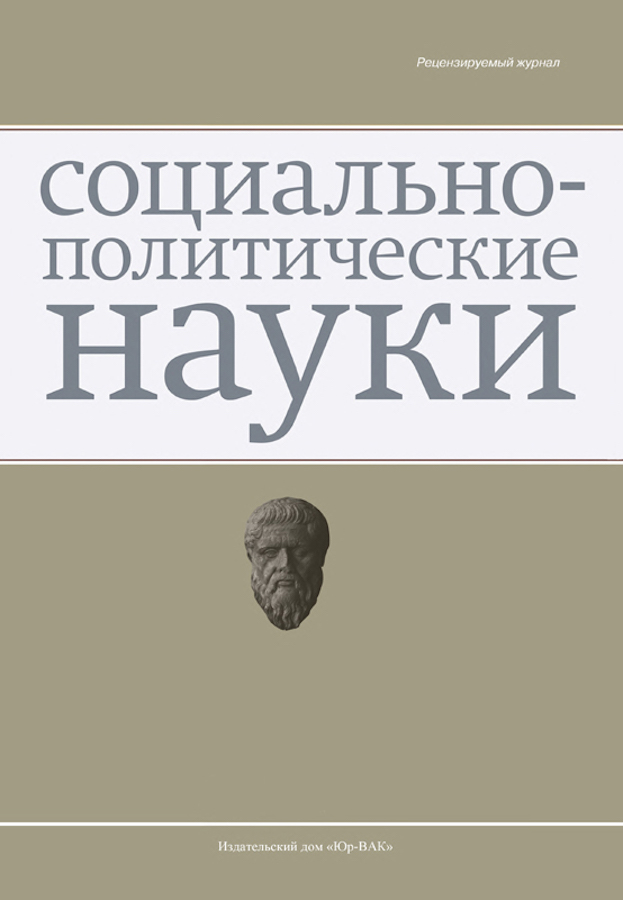Discourses and epistems as contexts of the dispersion of “newspeak” (based on the philosophy of M. Foucault)
- 作者: Oleshkova A.M.1
-
隶属关系:
- Nizhny Tagil Branch of Russian State Pedagogical University
- 期: 卷 13, 编号 2 (2023)
- 页面: 123-130
- 栏目: Social and Political Philosophy
- URL: https://journals.eco-vector.com/2223-0092/article/view/516505
- DOI: https://doi.org/10.33693/2223-0092-2023-13-2-123-130
- ID: 516505
如何引用文章
详细
The purpose of the study. In this article, the philosophical concept of Michel Foucault, summarizing the main stages of his work (archaeological, genealogical, the period of aesthetics of existence), is extrapolated to the genesis and manifestation of “newspeak” – an ideological language that constructs socio-political reality and simultaneously interprets. Conclusions. The variety of author’s concepts presented in Foucault’s works should be considered interrelated. Foucault’s works (primarily “Words and things”, “The archaeology of knowledge”, “To supervise and punish”, “Intellectuals and power”, “The will to truth: Beyond knowledge, power and sexuality”) they became the basis for the development of the methodology and methodology of discourse studies. The stylistics and specifics of the examples cited by Foucault, his conceptual model can be used for the socio-philosophical understanding of “newspeak” through the concepts of “discourse”, “episteme”, “discursive practice”, “panopticon”, etc. Taking into account the development of the processes of informatization and medialization, “newspeak” should be interpreted in several dimensions (subcultural language, artificial language, ideological language, which Foucault’s conceptual approach can encompas.
全文:
作者简介
Anna Oleshkova
Nizhny Tagil Branch of Russian State Pedagogical University
编辑信件的主要联系方式.
Email: oleshkova@bk.ru
Candidate of History; associate professor at the Department of Humanities and Socio-economic Sciences of the Nizhny Tagil Branch of Russian State Pedagogical University. Nizhny Tagil, Russian Federation.
俄罗斯联邦, Nizhny Tagil参考
- Radbil T.B., Marinova E.V., Ratsiburskaya L.V. et al. Active processes in the Internet language: Linguocognitive and pragmatic aspects: A collective monograph. L.V. Ratsiburskaya (ed.). Moscow: Nestor-History, 2019. 257 p.
- Beglova E.I. Semantic and pragmatic potential of an uncodified word in the journalism of the post-Soviet era: Monograph. Moscow; Sterlitamak: Moscow State Regional University; Sterlitamak State Pedagogical Akad., 2007. 353 p.
- Baudrillard J. Forget Foucault. Transl. from French by D. Kalugin. St. Petersburg: Vladimir Dal, 2000. 96 p.
- Vodak R. The politics of fear. What does the discourse of right-wing populists mean? Kharkiv: Humanitarian Center, 2018. 404 p.
- Volkov V.N. Simulacrum in the political life of modern Russia. Bulletin of the Kazan State University of Culture and Arts. 2012. Pp. 1–5. (In Rus.)
- Deleuze J. Foucault. Transl. from French E.V. Semina. Intro article by I.P. Ilyin. Moscow: Publishing House of Humanitarian Literature, 1998. 172 p.
- Deacon R. A. Production of subjectivities. Logos. 2008. No. 2 (65). Pp. 21–64. (In Rus.)
- Dyakov A.V. Michel Foucault and his time. St. Petersburg: Aleteya, 2010. 672 p.
- Zaitseva I.P. “Coronapsychosis”, “coronasceptics”, “covidism”, “covidophobia” and other sociolinguistic markers 2020. Communicative Research. 2020. Vol. 7. No. 4. Pp. 801–813. (In Rus.)
- Ilyinskaya S.G. Manipulated man (political instability as an expected consequence of modern educational technologies). Philosophical Thought. 2019. No. 11. Pp. 1–10. (In Rus.)
- Kozhemyakin E.A. Analysis of discourse as a system of dispersion in the tradition of French philosophy of the second half of the twentieth century (M. Foucault, M. Pesce). Nauchnye Vedomosti. 2008. No. 4 (44). pp. 5-17.
- Kornienko K.B. Business letter of the 30s of the XX century (based on the material of students’ personal files): Communicative and stylistic aspect. Dis. ... Cand. Sci. (Philol.). Arkhangelsk, 2022. 245 p.
- Kierkegaard S. Either – or. A fragment from life. Transl. from Da-nish of N. Isaeva, S. Isaev. Moscow: Academic Project, 2014. 775 p.
- Nauchev O.I., Pleshivtseva E.Yu. “Novoyaz” of the Internet: Sources and mechanisms of the emergence of a new vocabulary. World of Science. Sociology, Philology, Cultural Studies. 2021. Vol. 12. No. 4. Pp. 1–9.
- Orwell J. 1984. Transl. from English by V. Golyshev. M.: AST, 2014. 318 p.
- Oks M.V. Fictional languages in the poetics of the English-language novel of the XX century (based on the material of the novels “1984” by J. Orwell, “Clockwork Orange” by E. Burgess, “Under the Sign of Illegitimate” and “Pale Fire” by V. Nabokov). Abstract of dis. ... of Cand. Sci. (Philol.). Voronezh, 2005. 24 p.
- Wade S. Michel Foucault in the Valley of Death. How the great French philosopher tripped in California. Transl. I. Petrov. Moscow: RIPOL classic. 192 p.
- Foucault M. Archeology of knowledge. Transl. from French by M.B. Rakova, A.Yu. Serebryannikova; intro. art. by A.S. Kolesnikova. St. Petersburg: IC “Humanitarian Academy”; University book, 2004. 416 p.
- Foucault M. The Will to Truth: Beyond knowledge, power and sexuality. Works of different years. Transl. from French by M. Kastal, 1996. 448 p.
- Foucault M. Intellectuals and power: Selected political articles, speeches and interviews. Transl. from French by S.Ch. Ofertas. V.P. Vizgin and B.M. Skuratov (eds.). Moscow: Praxis, 2002. 384 p.
- Foucault M. Intellectuals and power: Selected political articles, speeches and interviews. Part 3. Transl. from French by B.M. Skuratov. V.P. Bolshakov (ed.). Moscow: Praxis, 2006. 320 p.
- Foucault M. The history of madness in the classical era. St. Petersburg, 1997. 576 p.
- Foucault M. To supervise and punish. The birth of prison. Moscow: Ad Marginem Press, 2015. 416 p.
- Foucault M. Mental illness and personality. Transl. from French, preface and comment. by O.A. Vlasova. 2nd edition, stereotype. St. Petersburg: IC “Humanitarian Academy”, 2010. 320 p.
- Foucault M. Words and things. Archeology of the Humanities. Transl. from French by V.P. Vizgin, N.S. Autonomova. Introductory article by N.S. Autonomova. St. Petersburg: A-cad, 1994. 408 p.
- Sheigal E.I. Semiotics of political discourse. Dis. ... Dr. Sci. (Philol.). Volgograd, 2000. 431 p.
- Nam Hye Hyun. Language and governance: “New Novoyaz” of the post-Soviet period. Studia Slavica Hung. 2017. No. 62. Pp. 355–369. (In Rus.)
补充文件








